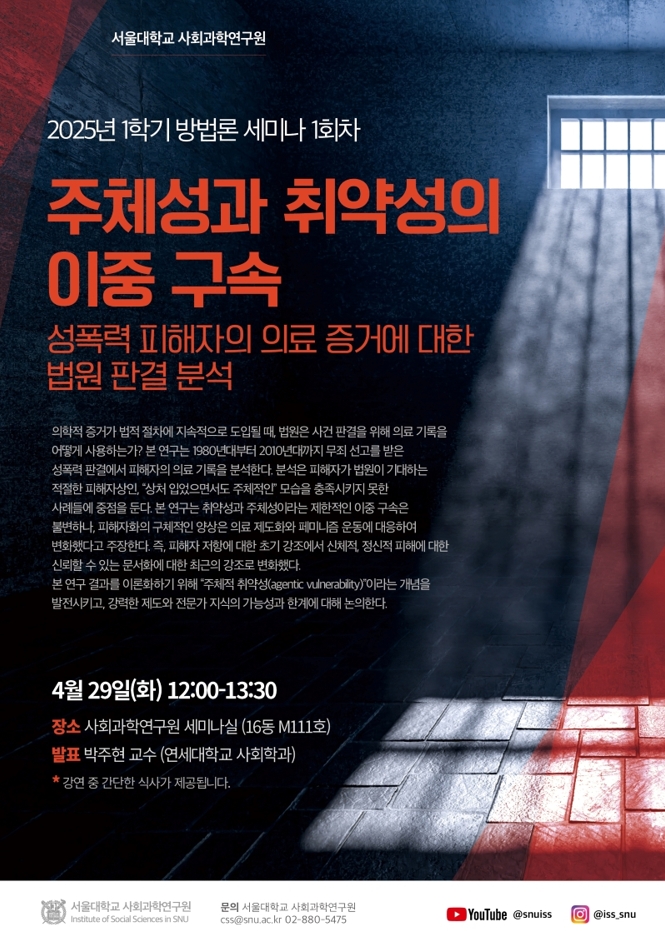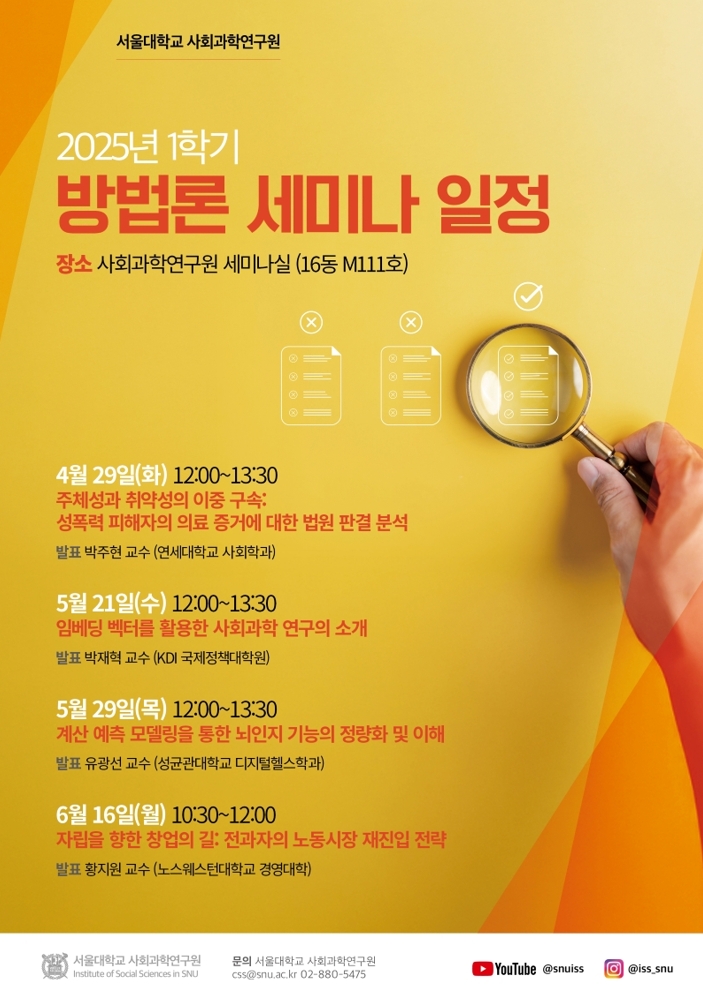The SNU Institute of Social Sciences launched its 2025 Methodology Forum, consisting of four seminars on various interdisciplinary topics relating to methodology, on April 29. The first seminar was led by Professor Park Joohyun of Yonsei University’s Department of Sociology in a discussion of her methodological research on sexual violence. The Forum series aims to promote interdisciplinary exchange by bringing together students and faculty to explore methodological research across disciplines such as information science, psychology, neuroscience, and nutrition.

Professor Park presenting her talk
Based on her ongoing research, Professor Park presented a talk titled “The Double Bind of Agency and Vulnerability: An Analysis of Court Rulings on Medical Evidence in Sexual Violence Cases.” Her work examines how Korean courts from the 1980s to the 2010s interpreted victims’ medical records in legal proceedings, analyzing 209 rulings where medical evidence was used to adjudicate sexual violence cases.

Seminar Poster: “The Double Bind of Agency and Vulnerability”
Professor Park first established that law and medicine are fields in which the meaning of victimhood is continually negotiated among state and civil actors. By analyzing court rulings and medical evidence, she sought to trace the evolving definitions of injuries and suffering within the Korean legal system. Importantly, Professor Park noted that the increasing use of scientific and medical evidence in sexual violence trials has not eliminated gendered assumptions. Rather, it has intensified legal disputes, prompting demands for increasingly detailed and technical forms of evidence. She reviewed the parallel developments in law, medicine, and social activism that have shaped this environment, noting that despite these advances, securing criminal punishment for sexual violence remains difficult. Central to her theoretical framework is the concept of “agentic vulnerability,” which captures the contradictory expectation that victims must appear both vulnerable enough to evoke sympathy and agentic enough to be deemed credible. This notion builds on the concepts of victimhood and the dynamic tension between suffering, agency, and legal recognition.
Per Park’s research, in the 1980s, courts focused primarily on physical resistance and visible injuries, based on normative assumptions that “true” victims would demonstrate bodily resistance. It is only in the 2000s that courts expanded their assessment to include psychological harm such as PTSD while also scrutinizing whether victims documented injuries, promptly reported assaults, and conformed to legal expectations of trauma. While these shifts broadened the evidentiary base, the heightened expectations have made legal recognition more elusive and placed greater demands on victims’ credibility.
Park’s analysis reveals that despite advancements in legal standards and medical understanding, the core double bind remains. Victims must still prove their suffering while appearing sufficiently agentic—resisting, reporting, and testifying—in order to be recognized within the legal system. The standard of the “ideal victim” has thus not disappeared but transformed, often to the detriment of those seeking justice. In the past, vulnerability and agency were aligned—physical resistance produced injuries, which validated victimhood. Today, however, expectations often conflict: victims must appear traumatized enough to elicit sympathy, yet composed enough to deliver coherent testimony. This tension continues to complicate their recognition in court.
Beyond its empirical insights, Professor Park’s study carries broad theoretical implications. She discussed key methodological concerns of her research, including the challenge of linking theoretical frameworks to empirical data, localising Western analytical tools, and interpreting fragmented historical records. Her work contributes to legal sociology by exposing the disjunction between formal law and its real-world application, and to medical sociology by interrogating the medicalization of harm. She emphasized the need to move beyond the binary of passive victims and active survivors, proposing agentic vulnerability as a more accurate framework for understanding contemporary victim politics. Furthermore, she links her findings to broader debates on citizenship, such as asylum and refugee adjudication, where similar agentic vulnerability paradoxes shape the process of recognition.

2025 Methodology Forum Poster
This seminar marks the first in a four-part series designed to foster methodological innovation and interdisciplinary dialogue. Upcoming sessions include “Introduction to Social Science Research Using Embedding Vectors,” “Quantifying and Understanding Brain Cognitive Function through Predictive Modelling,” and “The Path to Autonomy: Strategies for Labour Market Reentry for Formerly Incarcerated Individuals.” The Methodology Forum reflects the Institute for Social Sciences’ ongoing commitment to cross-disciplinary collaboration and critical reflection on the tools that shape contemporary research. We encourage the SNU community to participate in the upcoming seminars.
Written by Hyun Kyung Jung, SNU English Editor, jhyunk@snu.ac.kr

